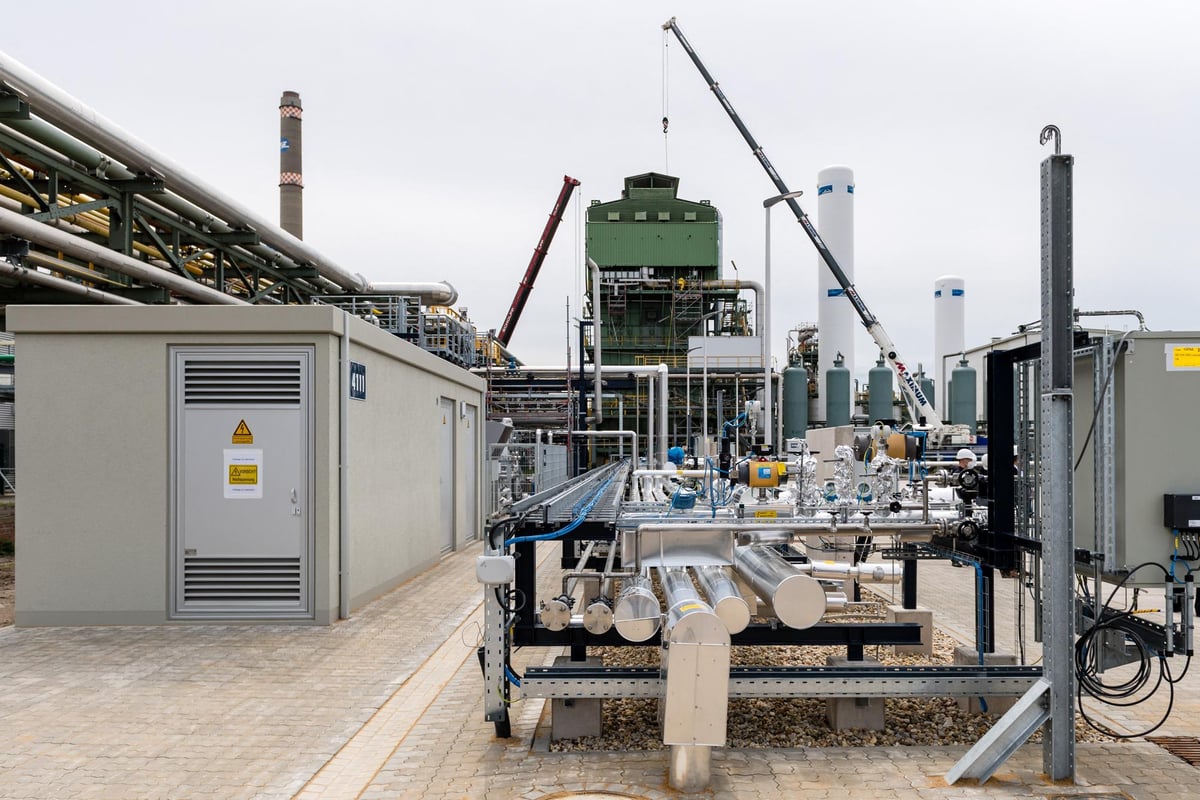Business
Derry Positioned as Future Hub for Green Hydrogen Economy

Researchers have identified Derry as a promising candidate for establishing a green hydrogen economy. This potential stems from a study conducted by the Centre for Advanced Sustainable Energy (CASE) at Queen’s University Belfast (QUB) and Economic, Planning and Environmental Consultants Ltd (EPEC). The findings suggest that Derry could effectively produce synthetic fuels using green hydrogen, primarily driven by its strategic location and existing infrastructure.
A detailed analysis highlights proposals from the System Operator for NI (SONI) regarding the development of the electricity grid, indicating that Derry is well-positioned for such initiatives. According to the authors of the report titled Hydrogen in Northern Ireland: Future Costs, Challenges and Implications, the city’s harbour, robust grid connections, and proximity to potential Scottish wind farms make it an ideal site for an e-fuels or e-chemicals business.
The study emphasizes that Derry could serve as a hub for the production, storage, and export of synthetic fuels derived from green hydrogen. “Examination of the plan shows that Derry/Londonderry could also be a suitable location for an e-fuels/e-chemicals business,” the report states, noting that shipping synthetic fuels is generally more manageable and denser than hydrogen itself. This transition may prompt the need for storage facilities, such as bunkering fuel for shipping.
The authors question whether locations like Larne, Belfast, or Derry/Londonderry could develop into marketplaces for these fuels, drawing parallels to the current use of Kilroot oil bunkers, which hold Ireland’s strategic oil reserve. They suggest that the demand for hydrogen and its synthetic fuels in Northern Ireland might primarily cater to international markets rather than domestic needs.
Proposed offshore wind farms are seen as vital to powering large electrolysers in Derry. These electrolysers would split water into hydrogen and oxygen, providing the essential feedstocks for a burgeoning e-fuel economy. The report underscores that the electricity generated by these wind farms will be crucial for the operation of electrolysers necessary for both energy storage and the future e-fuels or e-chemicals industry.
“Alternative options, such as using a wind farm in Scottish waters to power an electrolyser/e-fuels business in Derry/Londonderry or specific hydrogen projects co-located with a biorefinery are probably best developer-led to reflect the need for commercial funding of a realistic business case,” the report adds.
The authors detail two potentially large-scale applications for green hydrogen in Northern Ireland: energy storage and e-fuels or e-chemicals production. Energy storage could involve reserving hydrogen in large salt caverns located north of Belfast, while e-chemical production could occur in Derry. The report cautions that the success of such industries will largely depend on their cost-competitiveness compared to other international producers.
This research initiative was part of the Department for the Economy’s Open Call for research proposals issued in July 2024, aimed at gathering energy-related insights to inform policy development. As Derry advances toward a green hydrogen economy, the implications for local industry, energy security, and international trade could be significant.
-

 Top Stories3 months ago
Top Stories3 months agoTributes Surge for 9-Year-Old Leon Briody After Cancer Battle
-

 Entertainment4 months ago
Entertainment4 months agoAimee Osbourne Joins Family for Emotional Tribute to Ozzy
-

 Politics4 months ago
Politics4 months agoDanny Healy-Rae Considers Complaint After Altercation with Garda
-

 Top Stories4 months ago
Top Stories4 months agoIreland Enjoys Summer Heat as Hurricane Erin Approaches Atlantic
-

 World5 months ago
World5 months agoHawaii Commemorates 80 Years Since Hiroshima Bombing with Ceremony
-

 Top Stories3 months ago
Top Stories3 months agoNewcastle West Woman Patricia Foley Found Safe After Urgent Search
-

 Top Stories5 months ago
Top Stories5 months agoFianna Fáil TDs Urgently Consider Maire Geoghegan-Quinn for Presidency
-

 World5 months ago
World5 months agoCouple Convicted of Murdering Two-Year-Old Grandson in Wales
-

 World5 months ago
World5 months agoGaza Aid Distribution Tragedy: 20 Killed Amid Ongoing Violence
-

 World5 months ago
World5 months agoAristocrat Constance Marten and Partner Convicted of Infant Murder
-

 Top Stories4 months ago
Top Stories4 months agoClimbing Errigal: A Must-Do Summer Adventure in Donegal
-

 Top Stories4 months ago
Top Stories4 months agoHike Donegal’s Errigal Mountain NOW for Unforgettable Summer Views









